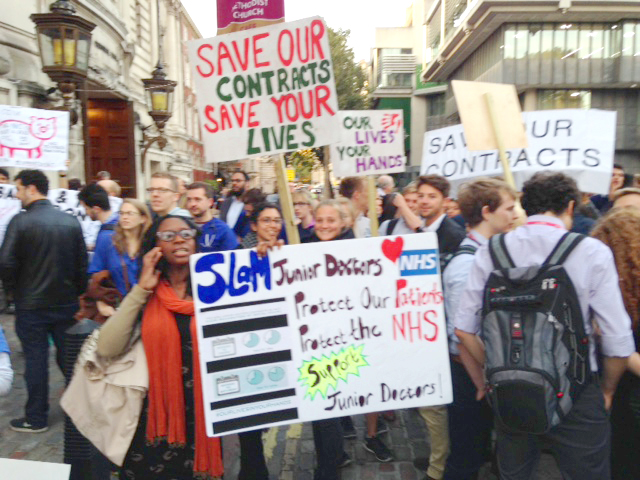
THE THREAT of industrial action by England’s 50,000 junior doctors has forced Tory health secretary Hunt to think again over plans to impose a 90-hour working week on them.
The new contract which Hunt wanted to impose also enforced a pay cut of 30%. The imposition of the new contract sparked the junior doctors to ballot for industrial action. However, yesterday a letter sent from health secretary Hunt to Dr Johann Malawana, BMA junior doctors committee chair, shows him backpedalling as fast as he can.
He writes: ‘I can give an absolute guarantee to junior doctors that this contract will not impose longer hours. No junior doctor working full time will be expected to work on average more than 48 hours a week.’
Later in the letter he adds: ‘… I can give an absolute guarantee that average pay for juniors will not reduce.’ After receiving the letter, Dr Malawana responded – refusing to take it at face value – stating: ‘It is encouraging that the health secretary has finally recognised the vital role that junior doctors play as tomorrow’s leaders across the NHS. However, questions still remain and we are urgently seeking clarification on the points raised in the letter.’
In the letter, Hunt makes three points: ‘Firstly, this is not a cost-cutting exercise. I can give you a categorical assurance that I am not seeking to save any money from the junior doctors’ paybill. Whilst I want to see an end to automatic annual increments (with pay rises instead based on moving through the stages of training and taking on more responsibility), these changes would be cost-neutral, rather than cost-saving.
‘This will mean that junior doctors would still benefit from four or five progression pay rises as they move through training. Secondly, I want the new contract to improve patient safety by better supporting a seven-day NHS. The Government was elected on a manifesto commitment to ensure that the quality of NHS care is the same across the week.
‘So together with NHS staff, we must eradicate the “weekend effect” of excess deaths in NHS hospitals. For junior doctors, this means some increase in plain time working (backed up with an increase in basic pay) and a replacement of the banding system, and a move to paying for hours worked, with additional pay for unsocial hours.
‘Within this, I can give an assurance that nights and Sundays will continue to attract unsocial hours payments. I would be pleased to discuss in negotiations how far plain time working extends on Saturdays. Thirdly, I believe that our ambition for the NHS to be the safest health care system in the world is underpinned by reducing, not increasing, the number of hours junior doctors work each week. Junior doctors already work seven days and are the backbone of medical care in hospitals at weekends and at night.’